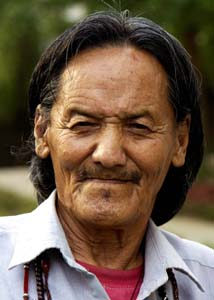Name: Gapa Akar
(Alias: No)
Gender: Male
Interview Age: 83
Date of Birth: 1929
Birthplace: Rungpo, Kham, Tibet
Year Left Tibet: 1960
Profession: Nomad
Monk/Nun: No
Political Prisoner: No

Interview No.: 65D
Date: 2012-05-17
Language: Tibetan
Location: Bir, Bir, Himachal Pradesh, India
Categories: Chinese Invasion and Occupation
Keywords: Chinese army -- invasion by , escape experiences, forced labor, herding, Kham, monasteries -- destruction of , nomadic life, resistance, shamans/mediums
Summary:
Gapa Akar was born into a nomadic family. He gives a description of a nomad's life--how it's spent caring for the numerous yaks and sheep. He explains how a nomad herded the livestock and obtained all one's needs from his animals. Gapa Akar also gives us an idea of how the animals were taken care of when they fall sick, the role-played by the ngagpa 'shamans' in healing and the of use of blessed pills as medicines.
This peaceful and contended life changed after the appearance of the Chinese. Gapa Akar talks about how the Chinese arrested leaders, confiscated their wealth and animals and forced him into a road construction crew. He recalls how the Chinese destroyed the Ranyag Monastery with cannons and machine guns and how most of the monks were killed there including Gapa Akar's own father and uncles. He describes the resistance put up by sword-wielding monks who were no match for the well-armed Chinese soldiers.
Gapa Akar fled to Lhasa when the Chinese attacked the nomads and drove away his family along with their animals. He encountered many other people fleeing and Tibetan guerrillas fighting against the Chinese as he traveled across Tibet. He endured many hardships trying to escape from the Chinese and went many times without food or water. Gapa Akar narrates his final escape journey through the Changthang to safety in Ladakh in India.
Interview Team:
- Rebecca Novick (Interviewer)
- Ronny Novick (Videographer)
- Tenzin Yangchen (Interpreter)

